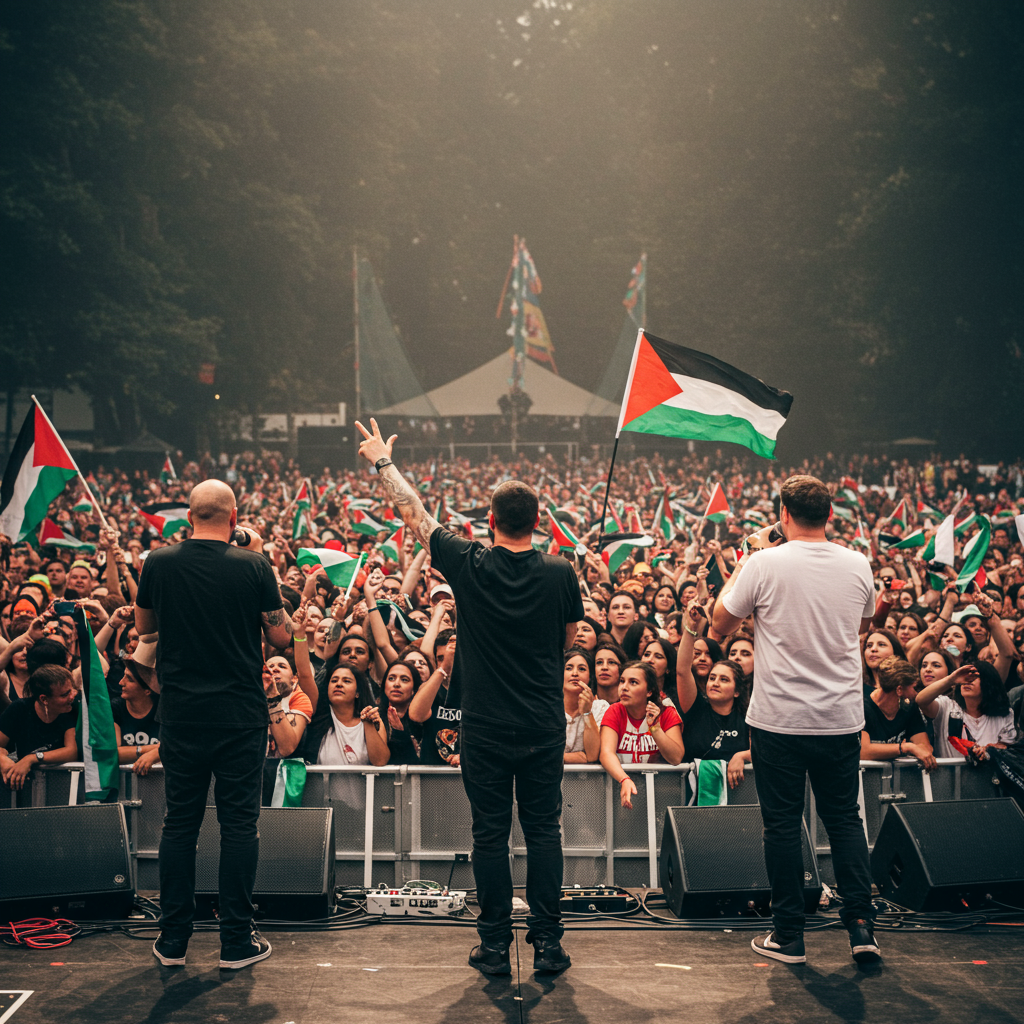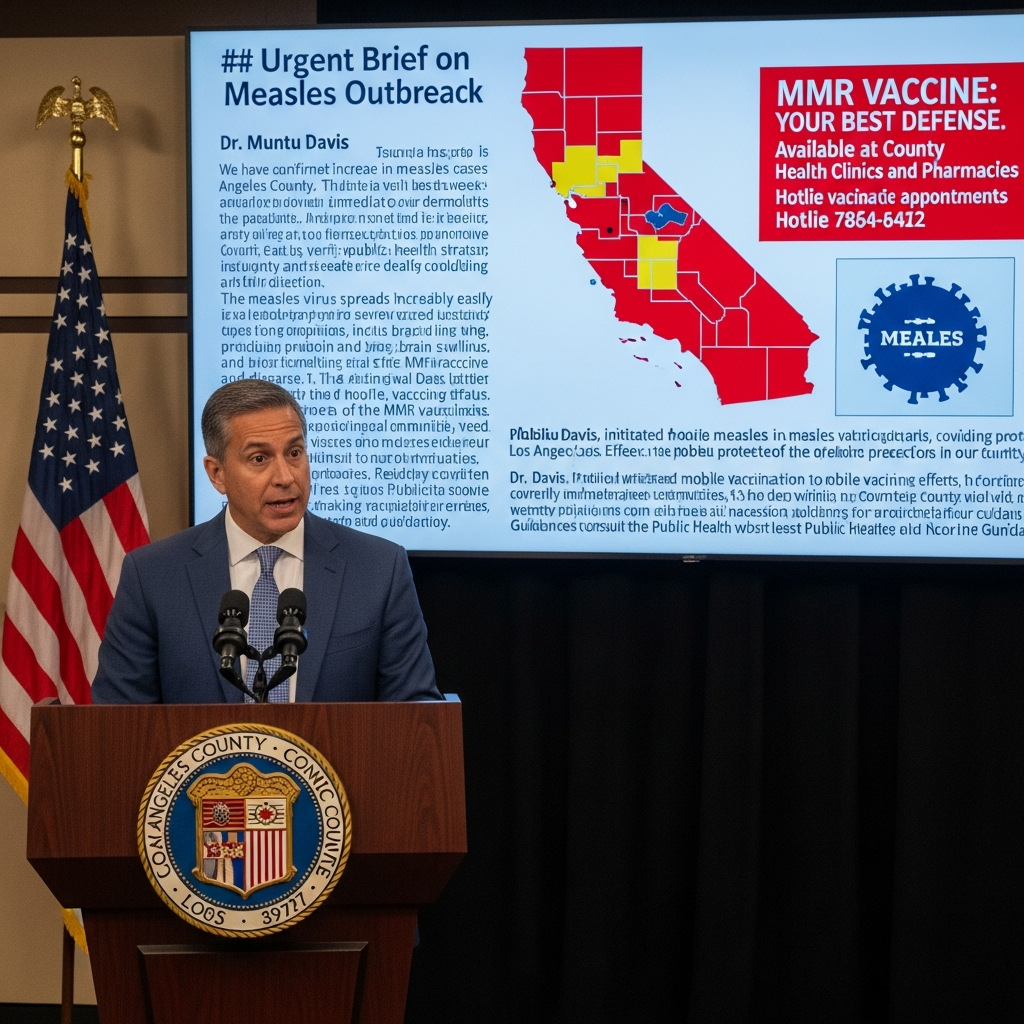Irish-language rap trio Kneecap delivered a highly charged performance at the Glastonbury Festival on June 28, 2025. Taking the stage at the packed West Holts field, the band played before tens of thousands. Many in the capacity crowd waved Palestinian flags and enthusiastically chanted “Free Palestine.” This prominent political display unfolded despite public criticism from UK Prime minister Keir Starmer, who had suggested the band’s appearance was inappropriate.
The Belfast-based group used their high-profile set to directly challenge their critics. Lead member Liam O’Hanna, known by his stage name Mo Chara, addressed the controversy early on. Wearing his distinctive Palestinian keffiyeh, he referenced Starmer’s comments. “The prime minister of your country, not mine, said he didn’t want us to play,” O’Hanna declared to the cheering audience. His defiant response was clear: “so f* Keir Starmer.”
Political Statements and Legal Battles
Beyond challenging political figures, Kneecap amplified their support for Palestinian groups. During the Glastonbury performance, Liam O’Hanna gave a specific “shout-out” to the Palestine Action Group. This group had recently been targeted by UK Interior Minister Yvette Cooper. She announced plans for the group to become proscribed, or banned, under the Terrorism Act of 2000. This move followed actions attributed to the activists, including allegations of vandalizing aircraft at a British Royal Air Force base. Fellow band member DJ Provai was also seen on stage wearing a t-shirt showing solidarity with the Palestine Action Group.
O’Hanna himself is currently entangled in legal proceedings under the same Terrorism Act. He faces a charge stemming from an incident in November 2024. At a London concert, he is alleged to have displayed a flag associated with Lebanon’s Hezbollah armed group. UK law lists Hezbollah and the Palestinian militant group Hamas as proscribed organizations, making public support a potential criminal offense. O’Hanna has maintained his innocence regarding the charge.
The Defense and Ongoing Case
Mo Chara has offered multiple explanations for the incident involving the flag. He claims he simply picked up a flag that was thrown onto the stage. He stated he did not know what it represented at the time. In interviews discussing the allegations, he has also suggested his controversial comments or actions were “a joke.” He told reporters the band members are “playing characters” on stage. O’Hanna is currently on unconditional bail. His next court hearing is scheduled for August. Taking the Glastonbury stage, he shouted, “Glastonbury, I’m a free man!” a clear reference to his recent legal situation.
Contextualizing the Controversy
The band directly links their activism to the ongoing conflict in Gaza. They displayed messages on screen stating, “The British Government is enabling genocide.” O’Hanna acknowledged the stress of his legal situation. However, he stressed it felt minimal compared to the suffering faced by Palestinians. “This situation can be quite stressful,” he said, “but it’s minimal compared to what the Palestinian people are [facing].” The band emphasized their belief that the focus should not be on Kneecap’s controversy. Instead, they argue, attention is needed on the “Genocide in Gaza.” Reports from Gaza’s Ministry of Health cite high numbers of casualties in the conflict.
Kneecap draws parallels between the Palestinian experience and Irish history. As a group from West Belfast and Derry, they state they understand colonialism firsthand. They referenced Ireland’s centuries under British rule. This historical context informs their outspoken political stance. Ireland’s government and people have been notable critics of the war in Gaza. Many see disturbing similarities between the situation there and Ireland’s past struggles.
Festival Backing and Industry Pressure
The decision to allow Kneecap to perform at Glastonbury was not without resistance. Beyond Prime Minister Starmer’s comments, reports suggested music industry insiders had signed a “secret letter” trying to prevent the band’s appearance. Kneecap publicly thanked Glastonbury organizers Michael and Emily Eavis for holding firm. They resisted significant pressure to remove the trio from the lineup. Glastonbury co-founder Michael Eavis defended the festival’s approach. He reportedly stated, “People that don’t like the politics of the event can go somewhere else.”
The controversy has had tangible consequences for the band outside of Glastonbury. Several of Kneecap’s scheduled concerts were canceled following recent events. These cancellations occurred in the wake of their performance at the Coachella Festival in California in April. At that show, they publicly accused Israel of committing genocide against Palestinians. They also stated this was enabled by the United States government. The cancellations have affected appearances in locations such as Scotland and Germany.
Media Coverage and Police Scrutiny
Public broadcasters faced decisions on how to cover the controversial set. The BBC, which typically broadcasts numerous Glastonbury performances live, opted not to show Kneecap’s set in real-time. A spokesperson indicated the performance might be made available online later. The band themselves suggested the BBC would face difficulties editing out their explicit language and political messaging.
The controversy extended to other artists on the same stage. British rap punk duo Bob Vylan performed just before Kneecap. During their set, Bob Vylan reportedly led the crowd in chants including “Death, death to the IDF.” The IDF refers to the Israeli army. A BBC spokesperson described these comments as “deeply offensive.” They confirmed the Bob Vylan set would not be re-aired on BBC iPlayer. This decision followed reports that UK Culture Minister Lisa Nandy had contacted the BBC Director General. She sought an “urgent explanation” after the chants aired live.
The performances by both Kneecap and Bob Vylan have drawn the attention of law enforcement. Avon and Somerset Police announced they would be reviewing footage from the West Holts stage. Their aim is to determine if any offenses may have been committed. Such findings could potentially trigger a criminal investigation. The Israeli embassy reacted strongly to the Bob Vylan chants. They called them “deeply disturbed” slogans advocating for dismantling Israel.
Broader Identity and Perception
Kneecap formed in 2017 in Belfast. The trio is known for their anarchic stage energy and satirical lyrics. Their name derives from “kneecapping,” a brutal punishment used during Northern Ireland’s period of violence known as the Troubles. Their lyrics often contain expletives and drug references. They have previously clashed with political figures and openly oppose British rule in Northern Ireland. Past controversies include videos where members allegedly shouted “up Hamas, up Hezbollah” or called on people to kill lawmakers. The band denies supporting violence and claims these instances are taken out of context or part of their performance.
Despite the controversies, many fans at Glastonbury expressed strong support. They viewed Kneecap as one of the few acts using their platform to address the situation in Palestine. Supporters carried flags and wore apparel showing solidarity. The band’s performance underscored their identity. Depending on one’s perspective, they are seen either as fearless figures standing against the establishment or as dangerous extremists. They had also released a video titled “See it. Say it. Censored” before the gig, urging action against the conflict in Gaza.
Frequently Asked Questions
What political statements did Kneecap make during their Glastonbury set?
During their Glastonbury performance on June 28, 2025, Irish rap trio Kneecap was highly political. They encouraged the capacity crowd to chant “Free Palestine” and led explicit chants targeting UK Prime Minister Keir Starmer. Member Liam O’Hanna gave a “shout-out” to the Palestine Action Group, which faces being banned under the Terrorism Act. The band displayed messages on screen connecting the UK government to the conflict in Gaza and stressed that the situation in Palestine, not their controversy, was the main story.
Why is a Kneecap member facing a “terror” charge in the UK?
Liam O’Hanna, also known as Mo Chara, a member of Kneecap, faces a charge under the UK’s Terrorism Act 2000. This stems from an incident in November 2024. He is alleged to have displayed a Hezbollah flag and chanted support for Hezbollah and Hamas at a London concert. Both groups are listed as proscribed organizations in the UK. O’Hanna denies the charge, claiming he picked up the flag unknowingly and that his controversial comments are part of his stage persona. He is currently on bail.
How did Glastonbury organizers and the BBC respond to the controversial performance?
Glastonbury organizers Michael and Emily Eavis stood by their decision to book Kneecap despite political pressure, including from the UK Prime Minister, and thanked them on stage. Co-founder Michael Eavis suggested those who dislike the politics could go elsewhere. The BBC, the public broadcaster covering the festival, chose not to air Kneecap’s set live, although they stated it might be made available online later. This decision followed controversy over potentially offensive chants made by artists on the same stage.
In summary, Kneecap’s performance at Glastonbury was a focal point of political expression, drawing significant crowd support while also highlighting the band’s ongoing legal challenges and generating further debate about freedom of speech versus allegations of supporting proscribed organizations within the context of the Gaza conflict. The event underscored the band’s controversial status and their unwavering commitment to their political messaging.



